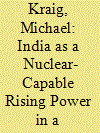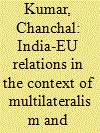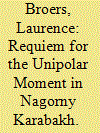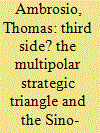| Srl | Item |
| 1 |
ID:
185652


|
|
|
|
|
| Summary/Abstract |
As Asia’s largest and most rapidly rising powers in contemporary global politics, relations between India and China are becoming evermore intertwined with each other. Clear commonalities typify this symbiosis, including a shared civilisational basis, a mutual desire to rebecome great powers in international relations and common modernisation goals. At the same time, relations are beset by a number of issues, most notably long-standing territorial disputes, frictions over regional hegemony and wider diplomatic tensions (most prominently relating to China–Pakistan and India–United States ties). As such, India–China relations can be considered to resemble a ‘double-edged sword’, whereby elements of their interaction can be regarded as having concurrent benefits and liabilities. This article explores the historical roots and contemporary realisation of such a core dynamic over the last 75 years of relations between New Delhi and Beijing and investigates how their strategic goals are often simultaneously convergent and divergent.
|
|
|
|
|
|
|
|
|
|
|
|
|
|
|
|
| 2 |
ID:
093279


|
|
|
|
|
| Publication |
New Delhi, Academic Foundation, 2010.
|
| Description |
352p.
|
| Standard Number |
9788171887996
|
|
|
|
|
|
|
|
|
|
|
|
Copies: C:2/I:0,R:0,Q:0
Circulation
| Accession# | Call# | Current Location | Status | Policy | Location |
| 054691 | 330.9/VIR 054691 | Main | On Shelf | General | |
| 054793 | 330.9/VIR 054793 | Main | On Shelf | General | |
|
|
|
|
| 3 |
ID:
088511


|
|
|
|
|
| Publication |
2009.
|
| Summary/Abstract |
The two global trends of multipolarity (rising powers) and non-polarity (failing states) are strongly present in the South Asian geopolitical context. India's competitive-cooperative relationship with China is clearly part of the multipolar trend of rising powers throughout the world, while India's long, antagonistic history with Pakistan is increasingly witness to a weakening and radicalized Pakistani state. In this mixed strategic environment, Indian nuclear weapons are neither a global bane nor a coercive form of power for compelling a lopsided agreement with Pakistan on Kashmir. Indeed, the greatest indirect challenge to South Asian stability is not Indian nuclear capabilities, but rather US grand strategy, which helps fuel centrifugal forces in Pakistan while potentially increasing the bellicosity of other powers such as Russia and China, with potentially negative long-term effects on the currently minimalist Indian nuclear policy.
|
|
|
|
|
|
|
|
|
|
|
|
|
|
|
|
| 4 |
ID:
118083


|
|
|
| 5 |
ID:
163260


|
|
|
|
|
| Summary/Abstract |
This article suggests that a powerful defence for open trade can be derived from offensive realism. Offensive realists posit that a state tries to maximize its relative material power in order to protect its security in the dangerous international realm. I argue that with regard to trade, relative power maximizing states have strong incentives to maintain free trade. Mainstream trade theories commonly suggest that an important mechanism through which trade affects a state's material capacity is specialization, which advances trading states' allocative and productive efficiency. When specialization is prioritized, the international trade structure is likely to be composed of multiple players, or be ‘multipolar’, and protectionist states are likely to encounter significant relative losses vis-à-vis other states. In the multipolar trade structure, even when a state is facing relative losses from existing commercial exchanges, employing extensive protectionist policies would weaken the state's relative power as it would incur even larger relative losses. In the offensive realist world where the failure to maximize relative power is dangerous, protectionism needs to be avoided precisely because it does not allow for power maximization. This argument is substantiated by an examination of the United Kingdom's decision to avoid protectionism during the decades leading up to First World War.
|
|
|
|
|
|
|
|
|
|
|
|
|
|
|
|
| 6 |
ID:
181520


|
|
|
|
|
| Summary/Abstract |
The Minsk Group, led by the United States, France, and Russia, has brokered the Armenian-Azerbaijani conflict since the mid-1990s after Armenia-backed secessionists in the unrecognized Nagorno-Karabakh Republic won the first Karabakh war of 1992–94. That mediation embodied the ideals of the mid-1990s unipolar moment, which assumed that liberalized markets and democratic transitions would converge internally to resolve legacy conflicts in postsocialist states while bringing them into convergence externally with Euro-Atlantic nations. Those assumptions withered away over the next quarter-century. Neither Azerbaijan nor Armenia transitioned to liberal democracy. Backed by an increasingly assertive Turkey, Azerbaijan prevailed in a bloody war in 2020. This time, the regional authoritarian powers, Russia and Turkey, are overseeing what could be a test case for a new form of “illiberal peace.”
|
|
|
|
|
|
|
|
|
|
|
|
|
|
|
|
| 7 |
ID:
113971


|
|
|
|
|
| Publication |
2012.
|
| Summary/Abstract |
China's modernisation mission is enduring but there continues to be a large mismatch in China's view of the world and how the world views China. This rejoinder questions China's commitment to political reform, discusses the economic challenges facing China and wonders whether there is a distinct and unique China growth model. Assessing China's impact as a rising power on the international system, it critiques China's global diplomacy and the future of US-China relations. The rejoinder is more circumspect on these issues than Cui's original article.
|
|
|
|
|
|
|
|
|
|
|
|
|
|
|
|
| 8 |
ID:
067642


|
|
|
| 9 |
ID:
101366


|
|
|